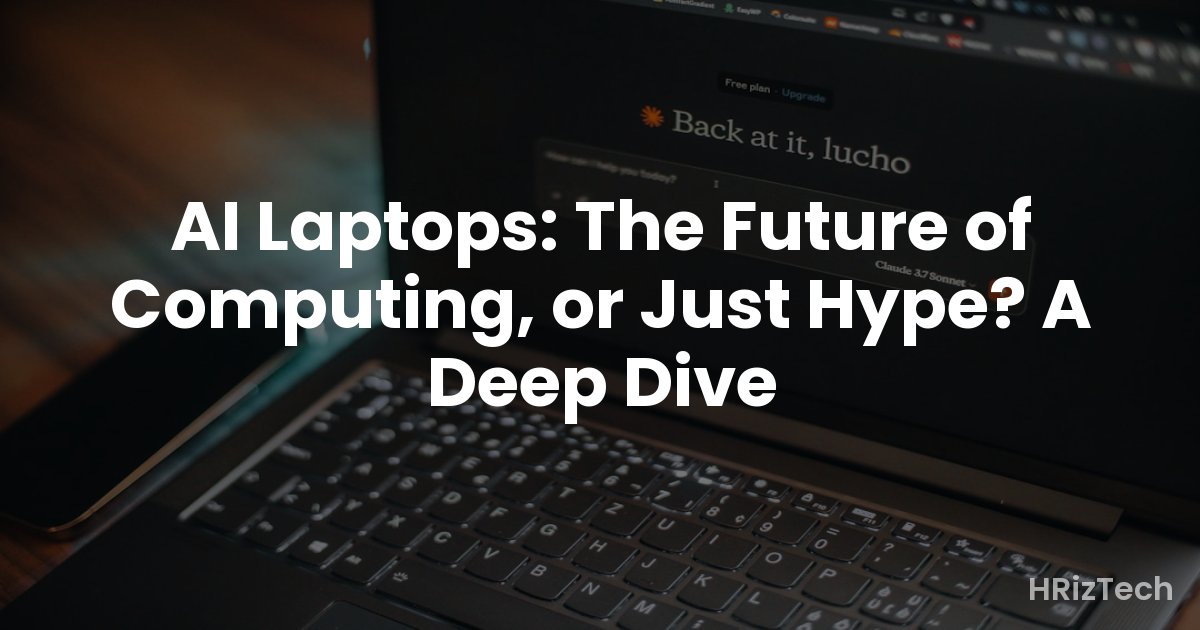AI Laptops: The Future of Computing, or Just Hype? A Deep Dive

AI Laptops: The Future of Computing, or Just Hype? A Deep Dive
- AI laptops offer significant performance boosts for specific tasks.
- Battery life can be negatively impacted by AI processing.
- Privacy concerns surrounding AI data collection are paramount.
- The cost of AI laptops currently surpasses traditional models.
- AI features are not universally beneficial; their utility depends heavily on individual needs.
Introduction: The Rise of the Intelligent Laptop
The integration of Artificial Intelligence (AI) into laptops is no longer a futuristic fantasy; it's a rapidly developing reality. Manufacturers are increasingly incorporating AI-powered features, promising enhanced performance, personalized experiences, and revolutionary functionalities. But are these promises holding up? This in-depth review delves into the current state of AI laptops, examining their advantages, disadvantages, and overall potential to reshape the computing landscape.
AI-Powered Features: What's Under the Hood?
Enhanced Processing Power:
Many AI laptops leverage dedicated AI accelerators, such as neural processing units (NPUs) or specialized GPUs, to significantly accelerate AI-related tasks. This translates to faster image and video processing, improved performance in demanding applications like video editing and 3D rendering, and smoother multitasking even with resource-intensive applications running concurrently. This is particularly noticeable in tasks involving machine learning, deep learning, and complex algorithms.
Intelligent Assistants:
AI assistants are becoming increasingly sophisticated. Beyond simple voice commands, these assistants are now capable of understanding context, anticipating user needs, and proactively offering assistance. This includes features like smart scheduling, automatic email summarization, and context-aware suggestions within applications.
Advanced Image and Video Processing:
AI is dramatically enhancing image and video processing capabilities. Features like real-time noise reduction, intelligent auto-focus, and AI-powered video stabilization are becoming commonplace. Furthermore, AI can enhance image quality, upscale resolutions, and even remove unwanted objects from photos and videos with remarkable accuracy.
Personalized User Experience:
AI allows for a highly personalized user experience. Laptops can learn user preferences, adapt to their working styles, and proactively optimize settings for optimal performance and comfort. This includes features like adaptive brightness, personalized keyboard layouts, and context-aware application suggestions.
The Pros of AI Laptops: A Productivity Powerhouse?
The benefits of AI laptops are undeniable for certain users. The increased processing power, especially for AI-intensive tasks, is a game-changer for professionals in fields like data science, video editing, and software development. The intelligent assistants significantly boost productivity by automating mundane tasks and providing context-aware assistance. The enhanced image and video processing capabilities are also attractive to content creators and photographers.
Furthermore, the personalized user experience contributes to a smoother and more efficient workflow. The adaptive features learn user behaviors, optimizing the laptop's settings for optimal performance and comfort. This contributes to reduced user fatigue and increased overall productivity.
The Cons of AI Laptops: Challenges and Concerns
Higher Cost:
AI laptops typically command a higher price tag compared to their non-AI counterparts. The inclusion of dedicated AI accelerators and the advanced software required to power AI features contribute to increased manufacturing costs.
Battery Life:
The increased processing power required for AI features can significantly impact battery life. The constant processing of data and execution of AI algorithms consume considerable energy, leading to shorter battery life compared to traditional laptops.
Privacy Concerns:
The collection and processing of user data by AI systems raise significant privacy concerns. The data collected can be used to personalize the user experience, but it also raises questions about data security and the potential for misuse. Users must be aware of the data collected and understand the privacy policies of the manufacturers.
Not Universally Beneficial:
It's crucial to acknowledge that AI features are not universally beneficial. The utility of AI features depends heavily on individual needs and usage patterns. For users who primarily perform basic tasks like web browsing and document editing, the added cost and potential drawbacks of AI laptops may outweigh the benefits.
Over-reliance on AI:
There's a risk of over-reliance on AI features. While these features can enhance productivity and efficiency, users should not become overly dependent on them. Developing critical thinking and problem-solving skills remains crucial, even with the advancements in AI technology.
Verdict: Are AI Laptops Worth the Investment?
The verdict on AI laptops is nuanced. They offer significant advantages for specific users, particularly those involved in AI-intensive tasks or who value personalized experiences. The enhanced processing power, intelligent assistants, and advanced image/video processing capabilities significantly boost productivity and efficiency. However, the higher cost, potential battery life issues, and privacy concerns must be carefully considered.
Ultimately, the decision of whether to invest in an AI laptop depends on individual needs and priorities. Users should carefully weigh the pros and cons, considering their usage patterns and the importance of AI features. If the enhanced processing power and AI-driven functionalities are essential for your workflow, then the investment may be worthwhile. However, if your needs are more basic, a traditional laptop might be a more cost-effective and practical choice.
The Future of AI Laptops: A Glimpse Ahead
The field of AI laptops is constantly evolving. We can anticipate further advancements in AI processing power, more sophisticated AI assistants, and even more personalized user experiences. As AI technology matures, we can expect AI laptops to become more powerful, energy-efficient, and affordable. The future likely holds even more seamless integration of AI into the everyday computing experience.
Key Takeaways
- AI laptops offer significant performance gains for specific applications but are not universally beneficial.
- Privacy concerns regarding data collection are a critical consideration.
- Battery life can be impacted negatively by AI-intensive operations.
- The higher cost compared to traditional laptops must be carefully weighed against the benefits.
- The decision to purchase an AI laptop should be based on individual needs and workflow requirements.
What are your thoughts on the future of AI laptops? Do you believe the advantages outweigh the drawbacks, or are the current challenges insurmountable?
Comments
No comments yet. Be the first to comment!